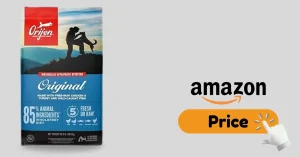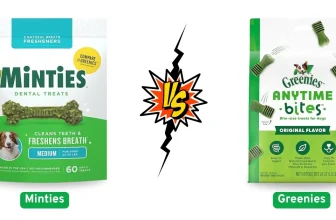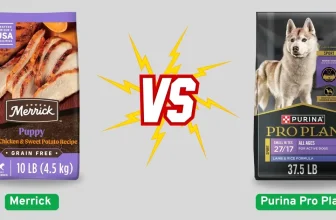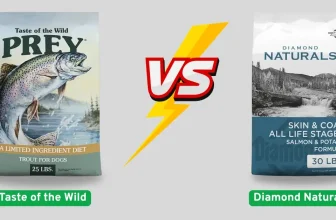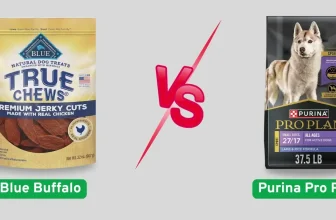Orijen vs Royal Canin: Jaw-Dropping Nutrition Secrets
When it comes to Orijen vs Royal Canin, the choice often comes down to natural nutrition versus science-based diets. Orijen focuses on high-protein, meat-rich recipes that mimic an ancestral diet, while Royal Canin builds its formulas around research and vet guidance. From my own experience, I’ve seen Orijen work well for active dogs that thrive on rich protein, and Royal Canin shine for pets with health issues like sensitive stomachs or weight control. Both brands are trusted, but the right pick depends on your dog’s needs—let’s break it down so you can make the best choice.
Is Orijen Dog Food Good?
Yes, Orijen dog food is good if you want a protein-rich, meat-first diet for your dog. In my own experience, it stands out for its “Biologically Appropriate” philosophy, which tries to mimic the ancestral diet of dogs. That means lots of fresh or raw meats, fish, and organ meats in every bag.
When I first tried Orijen with my dog, I noticed two things right away. One, my dog loved the flavor—probably thanks to the freeze-dried coating. Two, his coat looked shinier within weeks, which I credit to the high protein and healthy fats.
Orijen isn’t just about meat, though. It also includes fruits, veggies, and botanicals like pumpkin and turmeric. These help with digestion and overall wellness. The Original formula has about 38% protein, which is much higher than most kibble.
Still, it’s not perfect. Some experts have raised concerns about its heavy use of legumes in grain-free recipes, and the fact that the brand is now owned by Mars has left some people wondering if formulas could change in the future.
What I Like
- High-quality ingredients: I’ve seen the difference in my dog’s energy and coat. The fresh chicken, turkey, and fish really make it feel closer to a natural diet.
- WholePrey approach: I like that Orijen includes organs and bones, not just muscle meat. It feels more “complete” and less processed.
- Variety of formulas: I’ve tried both the Original and Six Fish recipes. The fish option was especially helpful when I suspected food sensitivities.
What Could Be Better
- Expensive: Orijen costs more than most dog foods. While I think it’s worth it for the quality, it may not fit every budget.
- High protein may not suit all dogs: My dog thrived, but I know some older or less active dogs may struggle with such a protein-heavy diet.
- Grain-free concerns: The grain-free line uses a lot of legumes, which some experts link to heart issues like DCM. Orijen has added grain-inclusive options in the USA, which is a step in the right direction.
Recommendation
I recommend Orijen for dogs who are active, energetic, and do well on a high-protein diet. It’s especially good if you want to feed something close to a raw diet but need the convenience of kibble.
If your dog is a picky eater, Orijen is worth trying—the freeze-dried coating usually wins them over. On the other hand, if your dog has kidney issues, low activity levels, or you’re on a tight budget, you might want to look at alternatives or consider Orijen’s Amazing Grains line.
For U.S. dog owners, availability is pretty good. I’ve found Orijen in both specialty pet stores and online (Chewy, Amazon, Petco). That makes it easy to keep consistent, which matters if your dog doesn’t like switching foods often.
Bottom line: Orijen dog food is one of the best high-protein kibbles on the market. It shines in quality, taste, and results, but it may not be the right match for every dog or every budget.
Is Royal Canin Dog Food Good?
Yes, Royal Canin dog food is good if you want science-backed nutrition. In my experience, it works best for dogs that need specific diets based on age, breed, or health issues. Unlike brands that focus only on ingredients, Royal Canin builds its food on nutrient balance and digestibility.
I’ve used it with my own dogs at different life stages. When one of mine started to gain weight, the Weight Care line helped him slim down without feeling hungry. Another time, I tried the Breed Health Nutrition formula for large breeds. I noticed less bloating and smoother digestion. For me, that showed Royal Canin delivers consistent, targeted nutrition.
Royal Canin often uses chicken by-product meal or dehydrated poultry proteins as the main protein source. It adds grains like rice or maize for carbs and fiber. Protein levels range from 19% to over 30%, depending on the recipe. That’s lower than high-meat brands like Orijen, but the goal here is health outcomes, not just protein numbers.
What I Like
- Targeted nutrition: I’ve seen how each recipe fits a need—weight care, digestion, or joint support. This focus is what makes the brand stand out.
- Vet-backed approach: My vet recommended it more than once, and I trust the research behind it. It feels less like guesswork and more like planned care.
- Lots of choices: Puppies, seniors, and even breeds like Labradors or Chihuahuas have their own options. I like that I can match food to my dog’s profile.
What Could Be Better
- Protein sources: It leans more on by-products and grains. Dogs that do better on meat-heavy food may need another option.
- Price: In the U.S., I’ve found it a bit pricey, especially the vet diets. You pay for the research, but not everyone can budget for it long-term.
- No grain-free: If you want grain-free food, Royal Canin doesn’t offer that. They stick with balanced formulas that include grains.
Recommendation
I recommend Royal Canin for dogs that need specific, tailored diets. It works well for managing weight, supporting breed traits, or helping with health issues under vet care. If you want digestibility, consistency, and expert guidance, this brand fits.
But if you’re after grain-free or very high-protein food, or if cost is your main concern, you may want to look at other brands. In the U.S., I find it easy to buy at vet offices, PetSmart, or Chewy, so keeping it stocked is simple.
Bottom line: Royal Canin is reliable, science-based, and trusted by vets. It may not be trendy or exotic, but for many dogs, it delivers exactly what they need.
Specifications / Formulation: Orijen vs Royal Canin Dog Food Comparison
Short take: Orijen pushes high meat and low carbs. Royal Canin targets specific health needs with tailored mixes.
| Topic | Orijen | Royal Canin |
|---|---|---|
| Main idea | High meat. WholePrey. | Targeted formulas. Clinical focus. |
| Grain policy | Mostly grain-free | Usually includes grains |
| Protein focus | Very high protein | Moderate to low (varies) |
| Life-stage | All life stages formulas | Many condition-specific formulas |
Rating — Orijen: 9/10. Royal Canin: 8/10.
Design / Packaging
Short take: Orijen looks premium and rustic. Royal Canin is clinical and clear.
| Topic | Orijen | Royal Canin |
|---|---|---|
| Bag / Can look | Heavy craft bag, photo of meat | Clean cans and labeled bags |
| Info on pack | Ingredient forward | Clinical charts and feeding guides |
| Sizes available | Small to large bags | Small cans to large bags |
| Storage ease | Resealable bags | Easy to stack cans |
Rating — Orijen: 8/10. Royal Canin: 9/10.
Features / Unique Selling Points
Short take: Orijen sells “Biologically Appropriate” meat-first food. Royal Canin sells targeted health science.
| Feature | Orijen | Royal Canin |
|---|---|---|
| USP | WholePrey, fresh meat % | Formulas for weight, skin, GI, etc. |
| Add-ins | Freeze-dried bits, organs | L-carnitine, fibers, specific nutrients |
| Claims | High protein, low carbs | Vet-driven, condition match |
| Marketing tone | Natural / ancestral | Clinical / precise |
Rating — Orijen: 9/10. Royal Canin: 9/10.
Performance / Nutritional Outcomes
Short take: Orijen gives strong muscle tone and shine. Royal Canin yields steady weight control and stability.
| Outcome | Orijen | Royal Canin |
|---|---|---|
| Weight | Good for active dogs | Good for weight control |
| Coat | Often shinier | Stable, depends on formula |
| Digestion | Can be rich for some | Gentle if formula matches need |
| Energy | High and sustained | Moderate, steady energy |
Rating — Orijen: 9/10. Royal Canin: 8/10.
Guaranteed Analysis
Short take: Orijen posts high protein/fat. Royal Canin lists tailored macros per diet.
| Metric | Orijen (typical) | Royal Canin (Weight Care wet) |
|---|---|---|
| Crude protein | ~38% (dry) | ~7.5% (wet) |
| Crude fat | ~18% (dry) | ~1.1–3.9% (wet) |
| Fiber | ~4% (dry) | ~2.1% (wet) |
| Moisture | ~12% (dry) | ~83% (wet) |
Rating — Orijen: 9/10. Royal Canin: 8/10.
High-Protein Dog Food Showdown: Orijen vs Royal Canin Nutrition Facts
Short take: Orijen is a high-protein leader. Royal Canin focuses on lower protein for some therapeutic lines.
| Aspect | Orijen | Royal Canin |
|---|---|---|
| Protein focus | High protein for muscle | Varies; weight/medical lines lower |
| Carb sources | Pulses, low starch | Grains and fillers in some lines |
| Fat sources | Animal fats, fish oil | Rendered fats, added oils |
| Best use | Active, working dogs | Overweight or clinical cases |
Rating — Orijen: 9/10. Royal Canin: 7.5/10.
Pricing & Cost Structure
Short take: Orijen costs more per pound. Royal Canin is mid-range to premium but cheaper per feeding for wet.
| Cost factor | Orijen | Royal Canin |
|---|---|---|
| Price level | Premium | Mid-premium |
| Cost per day | Higher for most dogs | Lower for many therapeutic feeds |
| Value note | Pay for ingredient quality | Pay for targeted science |
Rating — Orijen: 7/10. Royal Canin: 8/10.
Crude Fat in Dog Food Explained: What Your Dog Really Needs
Short take: Fat is fuel and skin oil. Too much or too little can cause issues.
| Point | Orijen | Royal Canin |
|---|---|---|
| Fat % typical | ~18% | ~1–4% (wet) or moderate in dry diets |
| Benefits | Energy, omega fats, coat health | Lower fat aids weight loss |
| Watch for | High fat for low activity dogs | Too low may dry coat or low energy |
| Best if | Adjust by dog activity level | Use for weight control or vet plan |
Rating — Orijen: 8.5/10. Royal Canin: 8/10.
Availability / Distribution (Ecosystem)
Short take: Both are widely sold. Royal Canin is in many vet clinics.
| Channel | Orijen | Royal Canin |
|---|---|---|
| Pet stores | Widely available | Widely available |
| Online | Many retailers | Many retailers + subscription |
| Vet clinics | Some carry it | Common in clinics |
| Global reach | Strong in US, EU, CA | Very strong global vet network |
Rating — Orijen: 8/10. Royal Canin: 9/10.
Brand / Reputation / Trust
Short take: Orijen is loved by owners who pick raw-like diets. Royal Canin is trusted by vets.
| Trust signal | Orijen | Royal Canin |
|---|---|---|
| Owner trust | High among premium buyers | High among clinical users |
| Vet trust | Mixed; depends on case | Very high in clinical settings |
| Transparency | Good ingredient lists | Good clinical data and guides |
| History | Premium niche brand | Decades in clinical nutrition |
Rating — Orijen: 8.5/10. Royal Canin: 9/10.
User Experience / Practical Use
Short take: Orijen needs careful portioning. Royal Canin is easy to feed for specific issues.
| Use case | Orijen | Royal Canin |
|---|---|---|
| Daily feed | Quick for active dogs | Easy for weight or GI plans |
| Mixing | Good with wet toppers | Designed to mix wet/dry |
| Transition | Needs slow switch for some | Often easy if matched to need |
| Smell/appeal | Very meaty | Palatable, savory wet options |
Rating — Orijen: 8.5/10. Royal Canin: 9/10.
Market Positioning / Target Audience
Short take: Orijen aims at health-first owners. Royal Canin aims at pet parents and vets needing precision.
| Target | Orijen | Royal Canin |
|---|---|---|
| Core buyer | Premium, ingredient-aware owners | Vets, owners with health goals |
| Messaging | Ancestral diet, raw ingredients | Science, condition match |
| Best match | Fitness, performance, whole food fans | Weight, skin, GI, sensitive dogs |
Rating — Orijen: 9/10. Royal Canin: 9/10.
Pros & Cons
Short take: Both shine in different ways. Pick by dog need, not brand buzz.
| Pros | Orijen | Royal Canin |
|---|---|---|
| Top pros | High quality meat. Rich nutrition. | Precise formulas. Vet backing. |
| Top cons | Higher cost. Can be rich for some dogs. | Uses by-products and grains in some lines. |
| Quick pick | For raw/whole food fans | For clinical and weight cases |
Rating — Orijen: 8.5/10. Royal Canin: 8.5/10.
Regulatory / Standards / Compliance
Short take: Both follow AAFCO and local rules. Royal Canin leans on clinical testing.
| Angle | Orijen | Royal Canin |
|---|---|---|
| Standards | AAFCO compliant | AAFCO + clinical data |
| Testing | Quality control at plants | Research and trials |
| Recalls | Industry history varies | Industry history varies |
| Vet role | Less clinic focus | Strong clinic partnerships |
Rating — Orijen: 8/10. Royal Canin: 9/10.
Future Trends / Innovation
Short take: Orijen pushes whole food and fresh meat. Royal Canin pushes targeted nutrition and research.
| Trend | Orijen | Royal Canin |
|---|---|---|
| R&D focus | Ingredient sourcing, fresh meat | Clinical trials, tailored recipes |
| Likely moves | More fresh blends, novel proteins | More precision diets, gut health tech |
| Edge | Ingredient story | Vet science and data |
Rating — Orijen: 8.5/10. Royal Canin: 9/10.
FAQs for Orijen vs Royal Canin
What are the main differences between Orijen and Royal Canin?
Orijen is a high-protein, grain-free food made with whole meats. Royal Canin is a vet-trusted brand that makes diets for weight, skin, and health needs.
Is Orijen or Royal Canin better for active dogs?
Orijen is better for active dogs because it is rich in protein and fat. It gives steady energy for muscle and stamina. Royal Canin works better for dogs with special needs.
Which is more affordable, Orijen or Royal Canin?
Royal Canin is often cheaper per serving, especially for wet diets. Orijen costs more but uses more fresh meat. The right choice depends on your dog’s health and budget.
Is Orijen or Royal Canin better for dogs with sensitive stomachs?
Royal Canin has vet-made recipes for sensitive stomachs and allergies. Orijen can be rich, so it may upset some dogs if not fed slowly. Choice depends on tolerance.
Which brand is more trusted by vets: Orijen or Royal Canin?
Royal Canin is widely recommended by vets due to clinical testing and research. Orijen is trusted by pet owners for its natural approach but is less vet-focused.
Where to Buy Orijen and Royal Canin Dog Food
Finding Orijen and Royal Canin dog food is easier than ever. Both brands have strong global distribution, so you don’t have to search far to keep your pup’s bowl full.
In my experience, Orijen is easiest to find online. I usually order from Chewy, Amazon, or Petco because the prices are steady and the delivery is quick. Local pet stores often carry it too, especially those that focus on premium or natural foods. I like buying it in-store when I want to check bag dates or talk with the staff about new batches.
Royal Canin, on the other hand, shows up almost everywhere — from vet clinics to big stores like PetSmart and Petco. I’ve even seen smaller, independent shops carry its breed-specific lines. For therapeutic or prescription diets, I’ve found it best to buy through a vet or a verified online retailer like Chewy’s “Vet Diet” section. That way, you’re sure you’re getting the right formula and it’s handled properly.
If you like saving on repeat orders, both brands offer auto-ship discounts through sites like Chewy or Amazon. I’ve used those for years — it’s nice to never run out of food, especially when you’re juggling busy days.
Tip: If you’re switching from one food to another, it’s smart to buy smaller bags first. That way, you can test how your dog adjusts before committing to a big order.
In short, whether you shop online or locally, both Orijen and Royal Canin are widely available. Orijen shines in specialty pet stores and online, while Royal Canin has the edge in vet offices and general retailers.
Orijen and Royal Canin Dog Food Recall History
When it comes to dog food, safety and trust matter as much as taste and nutrition. Both Orijen and Royal Canin have built strong reputations over the years, but like all long-standing brands, they’ve faced their share of challenges.
Let’s start with Orijen. The brand has a solid recall record, meaning there have been very few recalls in its history. One notable event happened in 2008, when Orijen cat food was recalled in Australia due to an issue related to local irradiation standards — not the food formula itself. Since then, there have been no major recalls of Orijen dog food. That track record speaks well of its strict sourcing and in-house manufacturing. Still, as a pet owner, I like to keep an eye on recall news — even the best brands deserve a little healthy scrutiny.
Royal Canin has been around much longer, so its recall history is a bit more complex. The most talked-about cases were in 2006 and 2007, tied to the industry-wide melamine contamination that affected many pet food brands. Royal Canin acted quickly, pulling products and tightening supplier checks. Since then, the brand has maintained a strong safety record and is known for its quality control and clinical testing. In my own use, I’ve never had an issue — every bag or can I’ve opened smelled fresh and consistent.
To me, both brands have shown they learn from the past. Orijen focuses on tight, local ingredient control in its kitchens. Royal Canin invests heavily in research and vet oversight to prevent problems before they happen. Neither is perfect, but both take pet safety seriously.
As a pet parent, I find comfort in that. It’s like trusting two different types of chefs — one who hand-picks every ingredient and one who tests every recipe in a lab. The goal is the same: keeping your dog safe, healthy, and happy.

Taslima Akter Sumaiya is a passionate pet mom and founder of PetFoodHubing.com. With real-life experience and insights inspired by USDA-ARS experts like Dr. Jitender P. Dubey, she writes honest, research-backed reviews to help dog and cat parents choose the best food. Trust her to simplify pet nutrition—with love and science. Read More…



